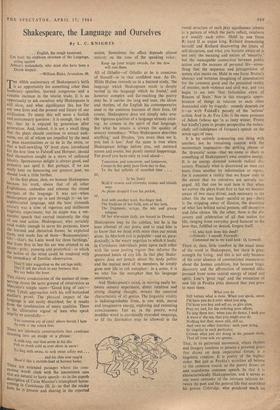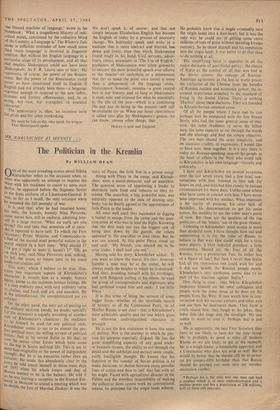Shakespeare, the Language and Ourselves
By L. C. KNIGHTS . . English, the rough basement. Los built the stubborn structure of the Language, acting against Albion's melancholy, who must else have been a Dumb despair.
—William Blake, Jerusalem, 40.
HE 400th- anniversary of Shakespeare's birth 1 is an opportunity for something other than laudatory speeches, learned congresses and a sizeable increase in the tourist trade. It is an opportunity to ask ourselves why Shakespeare is still alive, and what significance this has for our own lives and the present and future of our civilisation. To many this will seem a foolish and unnecessary question: it is enough, they will say, that he is enjoyed by generation after generation. And, indeed, it is not a small thing that the plays should continue to attract audi- ences, not all of whom are impelled by the need to pass examinations or to be in the swim, or that a half-unwilling '0' level class, introduced for the first time to Falstaff and Hotspur, should find themselves caught in a wave of unforced hilarity. Spontaneous delight is always good, and Pedantry can spoil it. But perhaps, if we are really bent on honouring our greatest poet, we should look a little further.
In the first place, then, we honour Shakespeare because his work, above that of all other Englishmen, embodies and releases the. stored energies of the language. It was not—when Shakespeare grew up in and through it—an un- sophisticated language, and the later sixteenth century was a time of vigorous and deliberate linguistic experiment; but its staple was a ver- nacular speech that carried insistently the ring of use and action. Shakespeare, who certainly read widely enough to serve his purposes, knew the learned and rhetorical forms; he exploited them, and made fun of them—`Remuneration!, Ohl—that's the Latin word for three farthings.' But from first to last his ear was attuned to an idiom—pithy, punning and proverbial—in which the action of the mind could be rendered with the immediacy of familiar observation.
They'll take suggestion as the cat laps milk; They'll tell the clock to any business that We say befits the hour.
This classic condensation of the essence of time- serving shares the same ground of observation as Mercutio's simple taunt—`Good king of cats'— When Tybalt approaches with his stiff-buttocked duellist's prowl. The physical impact of the language is not easily described, for it results from the combination of many qualities. There is the alliterative vigour of men who speak angrily or scornfully—
You common cry of curs! whose breath I hate As reek o' the rotten fens. There are idiomatic constructions that condense meaning into an image or a phrase: A milk-sop, one that never in his life Felt so much cold as over shoes in snow!
To hug with swine, to seek sweet safety out ...
. . . and his chin new reap'd how like a stubble-land at harvest home.
There are extended passages where the corn- Monest words clash with the uncommon uses that are natural to hasty speech—as in the superb description of Caius Marcius's triumphant home- T:nning in Coriolanus (II, i)—so that the reader feels he is present and sharing in the reported
action. Sometimes the effect depends almost entirely on the tone of the speaking voice: Keep up your bright swords, for the dew will rust them.
All of Othello—of Othello as he is conscious of himself—is in that confident ease. As Dr. Hilda Hulme reminds us in a learned study, 'the language which Shakespeare made is deeply rooted in the language which he found,' and however complex and far-reaching the poetry may be, it carries the tang and tone, the idiom and rhythm, of the English his contemporaries used in the common business of their lives. Of course, Shakespeare does not simply take over the vigorous qualities of a language already exist- ing: he creates in the spirit of that language. But what he retains is always the quality of sensory immediacy. 'When Shakespeare describes anything,' said Dryden, 'you more than see it, you feel it too.' And the same is true when Shakespeare brings before you, not outward scenes and events, but purely mental happenings. For proof you have only to read aloud—
Tomorrow, and tomorrow, and tomorrow, Creeps in this petty pace from day to day, To the last syllable of recorded time . . .
or, In his livery Walk'd crowns and crownets; realms and islands were As plates dropp'd from his pocket,
And with another knot, five-finger tied,.
The fractions of her faith, orts of her love, The fragments, scraps, the bits and greasy reliques Of her o'er-eaten faith, are bound to Diomed.
Shakespeare may be the subtlest, but he is the least ethereal of our poets, and to read him is to know that we think with more than our minds alone. In Macbeth evil is palpable—and so, para- doxically, is the weary negation to which it leads; in Coriolanus individuals press upon each other with the same jostling vigour that informs the presented bustle of city life. In that play Shake- speare does not preach about the body politic and the mutual need of its members, he simply gives new life to old metaphor: in .a sense, it is we who live the metaphor that his language constructs.
And Shakespeare's mind, in moving easily be- tween sensory experience, direct intuition and strong shaping thought, reveals the essential characteristic of all genius. The linguistic vitality is indistinguishable from, is one with, moral and imaginative energy, exploring and extending consciousness. Just as, in the poetry, word modifies word in continually extended meanings, so (if the distinction may be allowed) in the or,
moral structure of each play significance inheres in a pattern of which the parts reflect, reinforce aid modify each other. Hold in one focus Richard II as unjust king, Richard dramatising himself and Richard discovering the limits of self-deception, and what you become aware of is not only the meaning and nature of 'sincerity,' but the inescapable connection between public action and the recesses of personal life—some- thing that the sequence and juxtaposition of scenes also insists on. Hold in one focus Brutus's abstract and tortuous imagining of assassination for the common good and the presented reality of murder, mob violence and civil war, and you begin to see into 'that fathomless abyss of Reason of State.' Nor is this energetic appre- hension of things in relation to each other demanded only by tragedy: comedy depends on it—as with Falstaff's parody of the 'serious' action. And in As You Like It the mere presence of Adam (whose age 'is as lusty winter, Frosty but kindly') puts in proper perspective the melan- choly self-indulgence of Jacques's speech on the seven ages of man.
It is by actively connecting one thing with another, not by remaining content with the momentary impression—the striking phrase or the 'dramatic' scene—that we come to share in something of Shakespeare's own creative energy. It is an energy directed towards radical dis- covery. Precisely what is discovered no man can learn from another by information or report, for it concerns a reality that we know only to the extent that we ourselves are actively en- gaged. All that can be said here is that when we survey the plays from first to last we become aware of two main drives, each necessary to the other. On the one hand—painful or gaythere is the stripping away of illusion, the discovery of what lies behind social posture, self-deception and false choice. On the other, there is the dis- covery and celebration of all that makes for life, ranging from everyday good humour to the love that, fulfilled or denied, forgets itself.
—0, who bath done this deed? —Nobody: I myself. Farewell:
Commend me to my kind lord: 0, farewell.
There is, then, little comfort in the usual sense of the word in Shakespeare, but there is great strength for living: and this is not only because of the utter absence of conventional reassurance about the human condition, but because tragic discovery and the affirmation of renewal alike proceed from some central energy of mind and spirit. Lear's .'great rage' and the evocation of new life in Perdita alike demand that you grow to meet them.
What you do Still betters what is done. When you speak, sweet, l'ld have you do it ever: when you sing, rid have you buy and sell so, so give alms, Pray so; and, for the ordering your affairs, To sing them too : when you do dance, I wish you A wave o' the sea, that you might ever do Nothing but that; move still, still so, And own no other function: each your doing,
So singular in each particular, Crowns what you are doing in the present deeds,
That all your acts are queens.
That, in its patterned movement, where rhythm and imagery combine to present a personal grace that draws on deep impersonal forces, is a linguistic creation. It is poetry of the highest order. But just as Perdita's activities all belong to the common round, so the poetry draws on and transforms common speech. In that it is characteristically Shakespearian, and it serves as one more reminder of the intimate relation be- tween the poet and the general life that nourished . his genius. Coleridge, who pondered much on `AMERICA and the untravelled parts of thought.' Sir Thomas Browne's conjunction is not one that is likely to recur very readily to modern minds. Whatever else American thought may be it is no longer untravelled. The forest primeval has given way, in this, as in other more literal respects, to a network of thruways, expressways, Parkways and turnpikes, while every inter- section that perversity can contrive is catered for by clover-leaf crossings as ingenious as they are elaborate. The broad ribbons of history cross and criss-cross the face of America's past bearing a traffic that is seldom still. so as 'to deal with the salient aspects of the evolution of the American mind.' It does not pretend to complete coverage, but it inevitably invites comparison with its brilliant, perverse predecessor, Parrington's Main Currents of American Thought. In temper the great differ- ence is the exchange of a Marxist dogmatism for a liberal pluralism—the dominant tone of most of the contributors. No less striking, how- ever, is the shift of balance. One chapter dis- poses of the pre-Independence phase; five more cover the period to the Civil War.
0, My America!
Paths of American Thought. Edited by Arthur M. Schlesinger Jr. and Morton White. (Chatto and Windus, 50s.) The Whirligig of Politics. By J. Rogers Hollingsworth. (University of Chicago Press, 37s. 6d.) The Peculiar Institution : Negro Slavery in the American South. By Kenneth M. Stampp. (Eyre and Spottiswoode, 35s.)



































 Previous page
Previous page